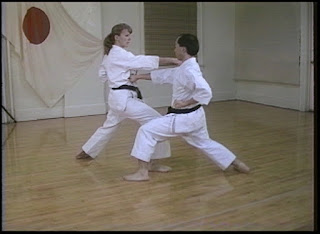by Phillip Starr
This phrase is simple and very straightforward, and the term “jikishin” can even be found in the names of a couple of very old and traditional Japanese martial ways (one involves the use of the sword, and the other centers on the naginata). Although the term “jiki/zhi” seems very basic, it isn't easily appreciated and has wider significance for the martial arts practitioner. Consider how most of us experience our environment every day; obviously, the way we spend our waking hours is considerably different from the way our early ancestors spent theirs. Their experience with the world tended to be direct and immediate. If a man was hungry, he went out to find something to eat; he either impaled it with his spear or grubbed around in the ground or bushes. Even as recently as a century ago, many of our forefathers butchered their own livestock and harvested their own crops. Nowadays, we rarely see food that has not been processed and wrapped in plastic. This important distinction in the way we relate to the world as compared to how our ancestors did can be seen in numerous cultural and personal practices.
We don't bury our own dead, women rarely give birth without the attendance of a doctor and oftentimes, the administration of medicines that actually distance the mother from the act of bearing the child. Today, people live life (or a lot of it, anyway) filtered through all kinds of artificial filters or mediums. Now, I'm not complaining; I'm very happy that I didn't have to kill and butcher the cod that I ate last night, and I love my air-conditioning. But the point remains that we live our lives without a lot of the immediate, direct experiences that were an everyday fact of life for our ancestors.
These filters of our day-to-day experiences impact the way that our current generation organizes their thought processes. If a predator (such as a lion) with an empty tummy showed up at the entrance to his shelter, early man didn't stop to rationalize about it; he had little use for such philosophy. He reacted instantly, grabbing his spear or whatever was handy and did what he had to do. If he was slow or took time to think about it, he'd end up as a very icky spot on the ground. America's pioneers faced an environment equally as hostile and they dealt with it in an equally direct and simple way. That's why you're here, reading this article today.
But the current genre of dangers and challenges we meet are usually of a different type altogether. They're often just as serious, often in the forms of lawsuits, and legal or financial crises. But again, we have intermediaries such as lawyers, accountants, and politicians to deal with them for us. Now, there's no doubt our ways of dealing with many problems are more sensible; if someone hits your car, it's better to sue for damages rather than cutting him in half with a sword. But if we rely too much on the intermediaries and filters, we can lose something valuable in ourselves; we can lose the ability to act and react as directly and immediately as our forefathers did.
To get an idea of what I mean, just watch the reactions of a student in the training hall react the first time he is “attacked” in even a remotely realistic manner. Sure, he's practiced the proper response many times but he's always had time to think and rationalize about it. But when the attack is made without warning or prior instruction, and it's made with a fair measure of intensity, the “filters” are gone. The reaction must be visceral and immediate, much like the cave-dweller facing that lion at his door. But most of the time, the student will jump back or attempt a frantic and usually ineffective parry. Afterwards, he may think that he needs a LOT more practice or rationalize it all and claim that he wasn't “ready” (which is the whole point). He may even claim that that's not how it would happen “on the street.” But all of the excuses (accurate or not) are immaterial; there's no need and no place for excuses, no matter how relevant they may be. We cannot rely on intermediaries or filters; we must respond with zhixin/jikishin...direct mind.
We must react without conscious forethought. A lawyer may succeed with clever rhetoric, a businessman may prevail by using careful economic analysis that gives him an edge, and a scientist may advance through careful study and deliberation. Not so in the training hall; all such approaches go right out the window. In the training hall, we are reminded of Oribe's scroll, “the direct mind is the place to practice.”

.jpg)
.jpg)
.jpg)



















No comments:
Post a Comment